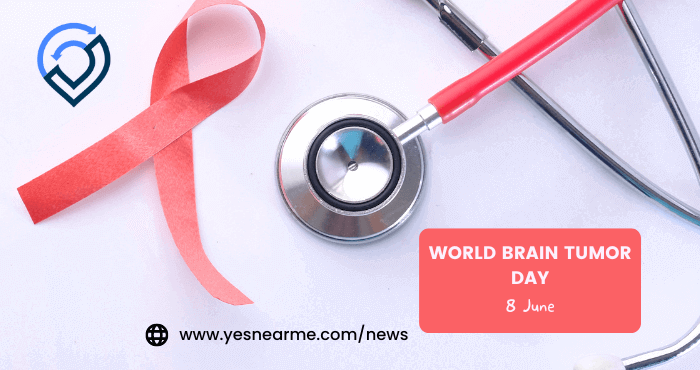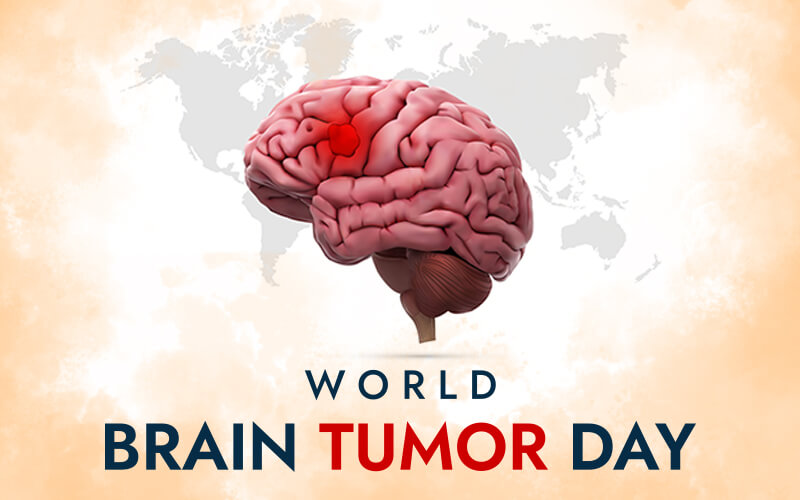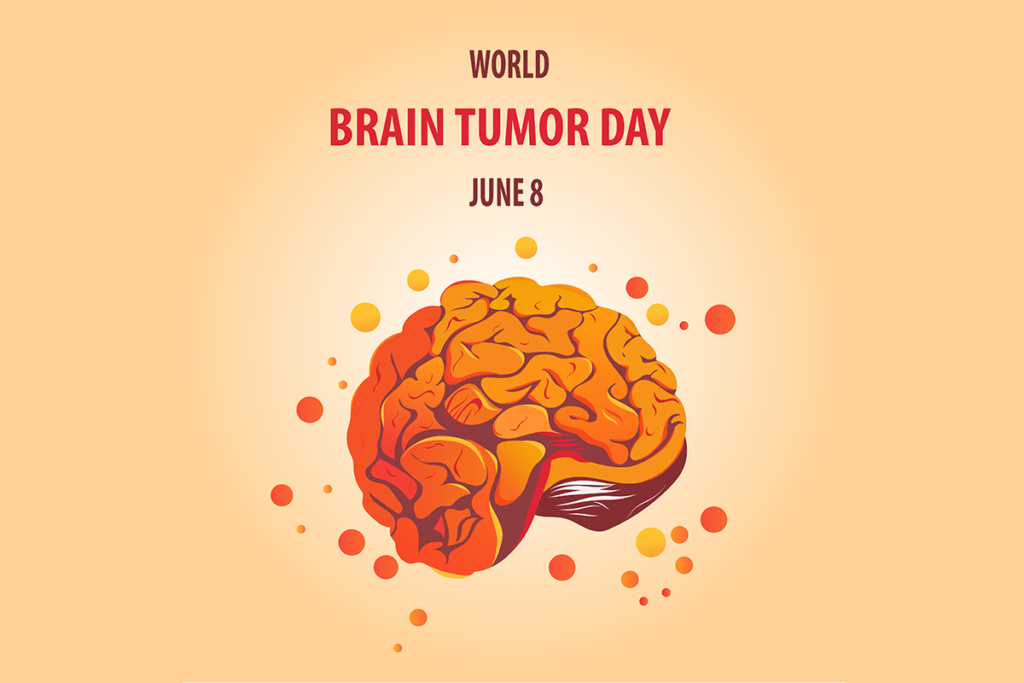
Table of Contents
World Brain Tumor Day: Raising Awareness and Advancing Research
Introduction

World Brain Tumor Day is observed annually on June 8 to raise awareness about brain tumors, their impact on patients and families, and the need for further research and medical advancements. Brain tumors affect millions of people worldwide, and the day is dedicated to spreading knowledge, supporting patients, and encouraging initiatives for early diagnosis and treatment.
A brain tumor is an abnormal growth of cells in or around the brain. Some tumors are benign (non-cancerous), while others are malignant (cancerous) and can be life-threatening. Due to the complexity of brain functions, even benign tumors can cause significant health challenges. Early detection, proper treatment, and continuous research are essential to improving survival rates and quality of life for those affected.
This article explores the history, significance, types, symptoms, causes, diagnosis, treatment, and prevention of brain tumors, along with global efforts to combat this serious health condition.
History and Significance of World Brain Tumor Day
World Brain Tumor Day was established in 2000 by the Deutsche Hirntumorhilfe e.V. (German Brain Tumor Association), a non-profit organization based in Germany. This initiative was created to increase global awareness, educate people about brain tumors, and promote research and support for patients and caregivers.
Since its inception, World Brain Tumor Day has gained international recognition, and organizations across the world now participate in campaigns, fundraising events, and awareness programs to highlight the challenges faced by brain tumor patients and their families.
The objectives of World Brain Tumor Day include:
- Educating the public about brain tumors and their impact.
- Encouraging early detection and timely treatment.
- Promoting scientific research for better therapies.
- Providing emotional and financial support to patients and families.
- Advocating for improved healthcare policies related to brain tumor treatment.
Types of Brain Tumors
Brain tumors are classified into two main categories: primary and secondary (metastatic) brain tumors.
1. Primary Brain Tumors
These originate in the brain and can be benign or malignant.
- Gliomas – The most common type, arising from glial cells. Examples include astrocytomas, oligodendrogliomas, and glioblastomas.
- Meningiomas – Develop in the meninges (protective layers of the brain and spinal cord). Often benign but can be aggressive.
- Pituitary Adenomas – Grow in the pituitary gland and affect hormone production.
- Medulloblastomas – Common in children, aggressive, and usually found in the cerebellum.
- Schwannomas – Arise from Schwann cells and affect nerves (e.g., acoustic neuromas).
2. Secondary (Metastatic) Brain Tumors
These tumors originate elsewhere in the body (e.g., lungs, breasts, skin) and spread to the brain. Common primary cancer sources include lung cancer, breast cancer, and melanoma.

Causes and Risk Factors
The exact causes of brain tumors remain largely unknown, but certain risk factors may increase the likelihood of developing them:
- Genetic Mutations – Inherited genetic disorders or spontaneous mutations can contribute.
- Exposure to Radiation – High-dose radiation from medical treatments or environmental exposure.
- Family History – A family history of brain tumors may indicate a genetic predisposition.
- Chemical Exposure – Prolonged exposure to harmful chemicals in industrial or agricultural settings.
- Immune System Disorders – Weakened immune systems may increase the risk.
Symptoms of Brain Tumors
Brain tumor symptoms vary depending on size, location, and growth rate. The symptoms may develop gradually or appear suddenly. Common symptoms include:
- Persistent Headaches – Frequent or worsening headaches, often more severe in the morning.
- Seizures – Sudden convulsions, twitching, or episodes of unconsciousness.
- Vision Problems – Blurred vision, double vision, or loss of peripheral vision.
- Hearing Issues – Hearing loss in one or both ears or persistent ringing (tinnitus).
- Nausea and Vomiting – Persistent nausea, especially in the morning or unrelated to food intake.
- Speech and Communication Difficulties – Trouble speaking, slurred speech, or difficulty understanding conversations.
- Cognitive and Memory Problems – Forgetfulness, difficulty concentrating, or confusion.
- Personality or Behavioral Changes – Mood swings, depression, anxiety, or sudden behavioral shifts.
- Loss of Balance and Coordination – Difficulty walking, frequent falls, or dizziness.
- Numbness or Weakness – Unexplained weakness or numbness in the limbs, often on one side of the body.
These symptoms can be caused by various conditions, so timely medical evaluation is essential for an accurate diagnosis.
Diagnosis of Brain Tumors
Diagnosing a brain tumor involves multiple tests and procedures to determine its presence, type, size, and location. The main diagnostic methods include:
- Neurological Examination – A doctor assesses motor skills, reflexes, coordination, balance, vision, hearing, and cognitive abilities to detect abnormalities.
- Imaging Tests:
- Magnetic Resonance Imaging (MRI) – The most commonly used test, providing detailed images of brain structures.
- Computed Tomography (CT) Scan – Helps identify tumors, bleeding, and swelling.
- Positron Emission Tomography (PET) Scan – Detects metabolic activity in tissues and distinguishes between benign and malignant growths.
- Biopsy – A small sample of the tumor is removed surgically or via needle extraction and examined under a microscope to determine if it is cancerous.
- Lumbar Puncture (Spinal Tap) – Examines cerebrospinal fluid for cancer cells or abnormal proteins.
- Molecular and Genetic Testing – Identifies specific genetic markers that can guide treatment decisions.
Early and accurate diagnosis is crucial for planning effective treatment strategies and improving patient outcomes.
Treatment Options for Brain Tumors
The treatment of brain tumors depends on several factors, including the type, size, location, and grade of the tumor, as well as the patient’s overall health. A combination of treatments may be used to remove, shrink, or control the tumor while preserving brain function. Here are the primary treatment options:
1. Surgery
Surgical removal is often the first-line treatment for brain tumors whenever possible. The goal is to remove as much of the tumor as possible without damaging critical brain functions.
- Complete Resection: If the tumor is in an accessible location, surgeons may remove it entirely.
- Partial Resection: When the tumor is near sensitive brain areas, only part of it may be removed to reduce symptoms and tumor pressure.
- Minimally Invasive Surgery: Techniques such as neuroendoscopy or laser ablation can help remove tumors with less impact on surrounding tissue.
For some tumors, surgery alone may be curative, while others require additional therapies to prevent regrowth.
2. Radiation Therapy
Radiation therapy uses high-energy beams (X-rays or protons) to target and destroy tumor cells. It is often used:
- After surgery to eliminate any remaining cancer cells.
- As the primary treatment for inoperable tumors.
- To manage tumor growth in malignant or recurrent cases.
Types of radiation therapy include:
- External Beam Radiation Therapy (EBRT): The most common form, directing radiation precisely at the tumor.
- Stereotactic Radiosurgery (SRS): A high-dose, focused radiation technique (e.g., Gamma Knife, CyberKnife) used for small or deep tumors.
- Proton Therapy: A more targeted approach that minimizes damage to healthy tissues, often used for children and sensitive brain areas.
3. Chemotherapy
Chemotherapy involves the use of drugs to kill cancer cells or stop their growth. It may be administered:
- Orally (pills or capsules).
- Intravenously (IV injections).
- Directly into the cerebrospinal fluid (intrathecal chemotherapy).
Common chemotherapy drugs for brain tumors include temozolomide (TMZ) and carmustine (BCNU). Chemotherapy is often used in combination with surgery and radiation, particularly for aggressive or recurrent tumors.
4. Targeted Therapy
Targeted therapy is a newer approach that focuses on specific molecules or pathways involved in tumor growth. Unlike chemotherapy, which affects both cancerous and healthy cells, targeted therapies are designed to attack only cancer cells, reducing side effects.
Examples include:
- Bevacizumab (Avastin): Blocks the formation of blood vessels that feed the tumor (anti-angiogenesis therapy).
- Larotrectinib and Entrectinib: Used for tumors with specific genetic mutations.
Genetic testing of the tumor helps determine whether a patient is a candidate for targeted therapy.
5. Immunotherapy
Immunotherapy helps the body’s immune system recognize and attack cancer cells. Though still in early stages for brain tumors, this treatment shows promise in clinical trials. Approaches include:
- Checkpoint Inhibitors: Help the immune system recognize cancer cells by blocking proteins that prevent immune attacks.
- Cancer Vaccines: Stimulate the immune system to attack tumor-specific proteins.
- CAR-T Cell Therapy: Genetically modifies a patient’s T cells to better recognize and destroy cancer cells.
Immunotherapy is mainly used for aggressive and recurrent brain tumors like glioblastomas.
6. Rehabilitation and Supportive Care
Brain tumors and their treatments can impact cognitive and physical functions. Rehabilitation therapies help patients regain lost abilities and improve quality of life:
- Physical Therapy: Restores movement, strength, and coordination.
- Occupational Therapy: Helps with daily activities such as dressing, eating, and using assistive devices.
- Speech Therapy: Aids in communication and swallowing difficulties.
- Neuropsychological Therapy: Supports cognitive function, memory, and emotional well-being.
In addition to rehabilitation, palliative care may be provided to manage symptoms like headaches, seizures, and fatigue, ensuring comfort and support throughout treatment
Prevention and Awareness of Brain Tumors
Brain tumors are complex conditions that may arise due to genetic factors, environmental influences, and lifestyle choices. While not all brain tumors can be prevented, adopting certain lifestyle habits and increasing awareness can help reduce risks and promote early detection.
1. Reducing Exposure to Radiation and Harmful Chemicals
Exposure to high levels of ionizing radiation and certain toxic chemicals has been linked to an increased risk of brain tumors. To minimize exposure:
- Limit Unnecessary Radiation: Avoid excessive exposure to X-rays and CT scans, especially in childhood. Ensure that medical imaging is used only when necessary.
- Use Protective Gear: If working in industries that involve radiation or hazardous chemicals, always wear protective equipment to minimize exposure.
- Be Cautious with Mobile Phones: While research is ongoing, using hands-free devices and limiting prolonged mobile phone use may help reduce exposure to radiofrequency radiation.
- Reduce Exposure to Pesticides and Industrial Toxins: Avoid prolonged contact with pesticides, solvents, and heavy metals, as they may contribute to cancer risks.
2. Maintaining a Healthy Diet and Regular Exercise
A balanced diet and physical activity play a crucial role in overall health and may help lower the risk of various cancers, including brain tumors. Key recommendations include:
- Eat Antioxidant-Rich Foods: Include fruits, vegetables, nuts, and whole grains in your diet to combat oxidative stress and support brain health.
- Reduce Processed and Red Meats: Limit the intake of processed foods, sugary drinks, and high-fat diets, as they may contribute to inflammation and cancer risk.
- Stay Hydrated: Drinking enough water ensures optimal brain function and detoxification.
- Exercise Regularly: Engage in moderate physical activity for at least 150 minutes per week to boost immunity and reduce cancer risks.
3. Avoiding Smoking and Excessive Alcohol Consumption
Smoking and excessive alcohol use have been associated with an increased risk of various cancers. To lower the risk:
- Quit Smoking: Tobacco contains carcinogenic substances that can affect overall brain and body health.
- Limit Alcohol Consumption: Excessive alcohol can lead to cellular damage and increase cancer susceptibility. Stick to moderate drinking guidelines (if any).
4. Managing Stress and Ensuring Proper Sleep Patterns
Chronic stress and poor sleep can contribute to a weakened immune system, which may increase the risk of diseases, including brain tumors. To maintain mental and physical well-being:
- Manage Stress Effectively: Practice relaxation techniques such as meditation, deep breathing, yoga, and mindfulness.
- Prioritize Quality Sleep: Aim for 7-9 hours of uninterrupted sleep to allow brain cells to repair and regenerate.
- Avoid Blue Light Before Bed: Reduce screen time before sleeping to maintain a healthy sleep cycle.
5. Undergoing Regular Medical Check-Ups
Early detection is crucial in improving outcomes for brain tumors. Routine medical examinations can help identify symptoms before they worsen.
- Stay Aware of Symptoms: Be vigilant about persistent headaches, vision changes, memory loss, dizziness, or seizures, and consult a doctor if these symptoms persist.
- Genetic Testing: If there is a family history of brain tumors, genetic counseling and screening may help assess the risk.
- Regular Health Screenings: Routine neurological check-ups and MRI scans (if advised by a physician) can help detect abnormalities early.
Global Awareness and Support Initiatives
Organizations worldwide, including the World Health Organization (WHO), National Brain Tumor Society (NBTS), and Brain Tumor Foundation, work to advance research and patient support. Activities on World Brain Tumor Day include:
- Awareness campaigns and educational seminars.
- Fundraising events for research and patient support.
- Memorial walks and support group meetings.
- Social media campaigns using hashtags like #WorldBrainTumorDay.
World Brain Tumor Day Message
Life is not a bed of roses for anybody. Never give up fighting. Happy World Brain Tumor Day.
Brain tumor is the growth of cells within the brain or central spinal cord. Keep fighting against it.
Today is a day that you should have fun and enjoy. .
Your existence makes the world a more wholesome place. Do not give up.
We know the despair you might feel but it’s either giving into that feeling or fighting. Wish you all the best, Happy World Brain Tumor Day.
You bring so much joy in our lives. We love you and you are not alone. .
There are many reasons in the world to be happy for and although your struggle is difficult, you are blessed to be loved by so many people around the world.
Brain tumor is tough but you are tougher..
There are no words to describe your strength and courage.
Have faith because faith can work miracles even when science cannot.
World Brain Tumor Day Quotes
“To live as well as I can with this disease, I find it helpful to be able to turn toward pain and difficulties rather than away.” – Gretel, ependymoma survivor
“It is crucial to maintain hope despite the substantial and numerous challenges of this devastating disease.” – Kathy, caregiver, and founder of the International Brain Tumor Alliance
“Don’t panic! Procedures are evolving. Be positive and never give up hope. It’s also important to do your research, seek a second opinion and find an expert care team so you can continue to live life to the fullest.” – Lawrence, pineal region tumor survivor
“It is crucial to maintain hope despite the substantial and numerous challenges of this devastating disease.” – Kathy, caregiver, and founder of the International Brain Tumor Alliance
World Brain Tumor day Wishes
-You make our lives so much more enjoyable. We care about you and want you to know but you’re not alone. On this World Brain Tumor Day, we wish you all the best.
-There are no phrases to adequately express your bravery and strength. On this, we wish you all the best.
-To the doctors who labor diligently to heal patients with brain tumors, Happy , You’re all true heroes!
-We understand your misery, but it’s either giving in to it or battling it. I wish you the best of luck. On this, we wish you all the best.
-An individual who is battling a brain tumor should intimidate you. He or she is a badass to the core! we wish you all the best.
-To the doctors who labor diligently to heal patients with brain tumors, You’re all true heroes!
-Thank you to all of the community clinics and organizations who have helped to raise awareness about the condition. Keep up the excellent work. .
-You make our lives so much more enjoyable. We care about you and want you to know but you’re not alone.
-Do not give up hope for the gem of your eyes, dear family and friends. To get through this, you’ll need all of your strength and support. Best wishes to you.
-You’re all incredibly brave, and you’re an inspiration to the little children who are going through something similar. On this World Brain Tumor Day, we wish you all the best.
Conclusion
World Brain Tumor Day plays a crucial role in spreading awareness, encouraging research, and supporting those affected. Brain tumors pose a serious health challenge, but early detection, advanced treatments, and continuous research provide hope for improved survival rates and quality of life.
By educating ourselves and others, we can contribute to brain tumor awareness, early diagnosis, and the pursuit of a cure. Let us join hands in the fight against brain tumors and strive for a future where better treatments and ultimately a cure become a reality.
For More Info You Can Visit Here .
Want to read more articles like this? Explore now!

